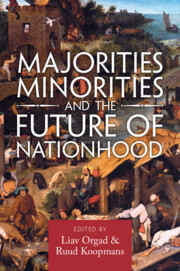Book contents
- Majorities, Minorities, and the Future of Nationhood
- Majorities, Minorities, and the Future of Nationhood
- Copyright page
- Contents
- Figures
- Tables
- Contributors
- Preface
- Acknowledgments
- A Note on the Cover
- 1 Majority–Minority Constellations
- 2 Are There Any Cultural Majority Rights?
- 3 Identity Not Culture
- 4 Nationhood, Multiculturalism, and the Ethics of Membership
- 5 Reconciling the Cultural Claims of Majorities and Minorities
- 6 Linking Minority Rights and Majority Attitudes
- 7 The Liberalism of Fear
- 8 Multiculturalism without Privileging Liberalism
- 9 Why Every Nation Should Nurture (a Thick and Inclusive) Nationalism
- 10 Populism and Cultural Majority Rights
- 11 Legitimate Populism and Liberal Overreach
- 12 The Causes of Populism and the Problem of Cultural Majority Rights
- Index
- References
10 - Populism and Cultural Majority Rights
An Uneasy Relationship
Published online by Cambridge University Press: 12 November 2022
- Majorities, Minorities, and the Future of Nationhood
- Majorities, Minorities, and the Future of Nationhood
- Copyright page
- Contents
- Figures
- Tables
- Contributors
- Preface
- Acknowledgments
- A Note on the Cover
- 1 Majority–Minority Constellations
- 2 Are There Any Cultural Majority Rights?
- 3 Identity Not Culture
- 4 Nationhood, Multiculturalism, and the Ethics of Membership
- 5 Reconciling the Cultural Claims of Majorities and Minorities
- 6 Linking Minority Rights and Majority Attitudes
- 7 The Liberalism of Fear
- 8 Multiculturalism without Privileging Liberalism
- 9 Why Every Nation Should Nurture (a Thick and Inclusive) Nationalism
- 10 Populism and Cultural Majority Rights
- 11 Legitimate Populism and Liberal Overreach
- 12 The Causes of Populism and the Problem of Cultural Majority Rights
- Index
- References
Summary
Populism is the most visible and controversial political form in which majority nationalism expresses itself in Western societies. A key question is whether populism is commensurable with, or even injects new life into (atrophying) liberal democracies. This chapter answers this question in the negative, because of populism’s inherent illiberalism and anti-pluralism that undermine the “liberal” pillar of liberal democracy, and thus pose a threat to democracy itself. When trying to explain its rise, the unresolved challenge is to calibrate economic and cultural factors. On the one hand, neoliberal globalization’s attack on lower middle-class prosperity and aspirations seems to be a principal cause of the populist upheaval in the West. On the other hand, this populism perceives itself less as a socioeconomic than a cultural cause, mobilizing rooted majority identity against cosmopolitan elites and immigrants particularly. The move onto the cultural terrain, and adoption of the majority–minority binary, conceals the neoliberal demolition of the social rights of all. Preempting populism by cultural majority rights is not only tangential to some of its deeper sources but it also underestimates the capacity of existing legal-political arrangements to deal with cultural majority claims.
- Type
- Chapter
- Information
- Majorities, Minorities, and the Future of Nationhood , pp. 247 - 279Publisher: Cambridge University PressPrint publication year: 2022

